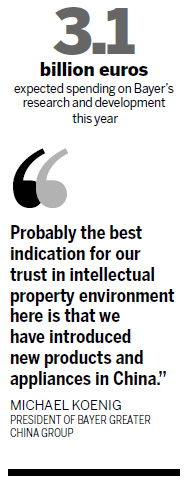|

Display promoting Bayer's iconic over-the-counter aspirin. The company will invest about $4.2 billion in research this year. Provided to China Daily
|

Clauses in the latest revision of China's patent law permitting compulsory licensing of patented medicines has triggered concern among some companies, but pharmaceutical and chemical giant Bayer is remaining calm.
Jorg Thomaier, chief intellectual property counsel of the German company, told China Daily in a recent interview that traditional international standard is for compulsory licensing to be triggered only in an emergency.
"China has never required compulsory licensing in the past," said Oliver Lutze, who is in charge of Bayer's intellectual property affairs in China.
Even during emergencies, governments consult with pharmaceutical companies before making a move.
"The only dangers from compulsory licensing is extending it beyond that use or using it excessively," which would "damage our efforts to develop new medicines and contribute to health", Thomaier noted.
Even if it might happen, it must be done in accordance with international practices and accords, he added.
In the case of emergencies when the government believes compulsory licensing is needed, consultation with patent owners will help the government, Lutze said.
"Most patent owners are willing to discuss what can be done to help with authorities. There is no need for compulsory licensing in many cases.
"Most patentees are very collaborative in discussing the situations where compulsory licensing or something else is needed," he said. "If they do it voluntary, it is much better than being forced."
"Bayer's 150 years of sustainable development and intensive research contribute to its success," said Michael Koenig, president of Bayer Greater China Group.
The company's R&D budget in 2010 is expected to reach 3.1 billion euros (about $4.2 billion), up from 2.7 billion euros last year. More than 67 percent went into medicines and medical treatment.
"Even in the past we were able to create amazing result of three inventions every working day," Koenig said. "Protecting our patents and achievements are crucial to us."
"Probably the best indication for our trust in intellectual property environment here is that we have introduced new products and appliances in China," he noted.
The company's increasing R&D investment in China also reflects confidence in the nation, he added.
The company established a global medical R&D center in Beijing last year.
Bayer now has 23 companies on the Chinese mainland, in Hong Kong and Taiwan, with businesses ranging from healthcare and crop science to new materials.
China is Bayer's largest single market in Asia, with sales of around 2.1 billion euros ($2.85 billion) in 2009.
Bayer has also forged close relations in the academic circles and recently renewed an intellectual property rights program at Shanghai's Tongji University, marking the fifth year of the effort.
The two have co-hosted an annual IPR forum that attracts members of industry, academia and law.
"China is in the focus of Bayer's various activities," Koenig said. The forum is "where we involve ourselves in protecting our valuable and important research results."
China Daily
(China Daily 11/24/2010 page11)
